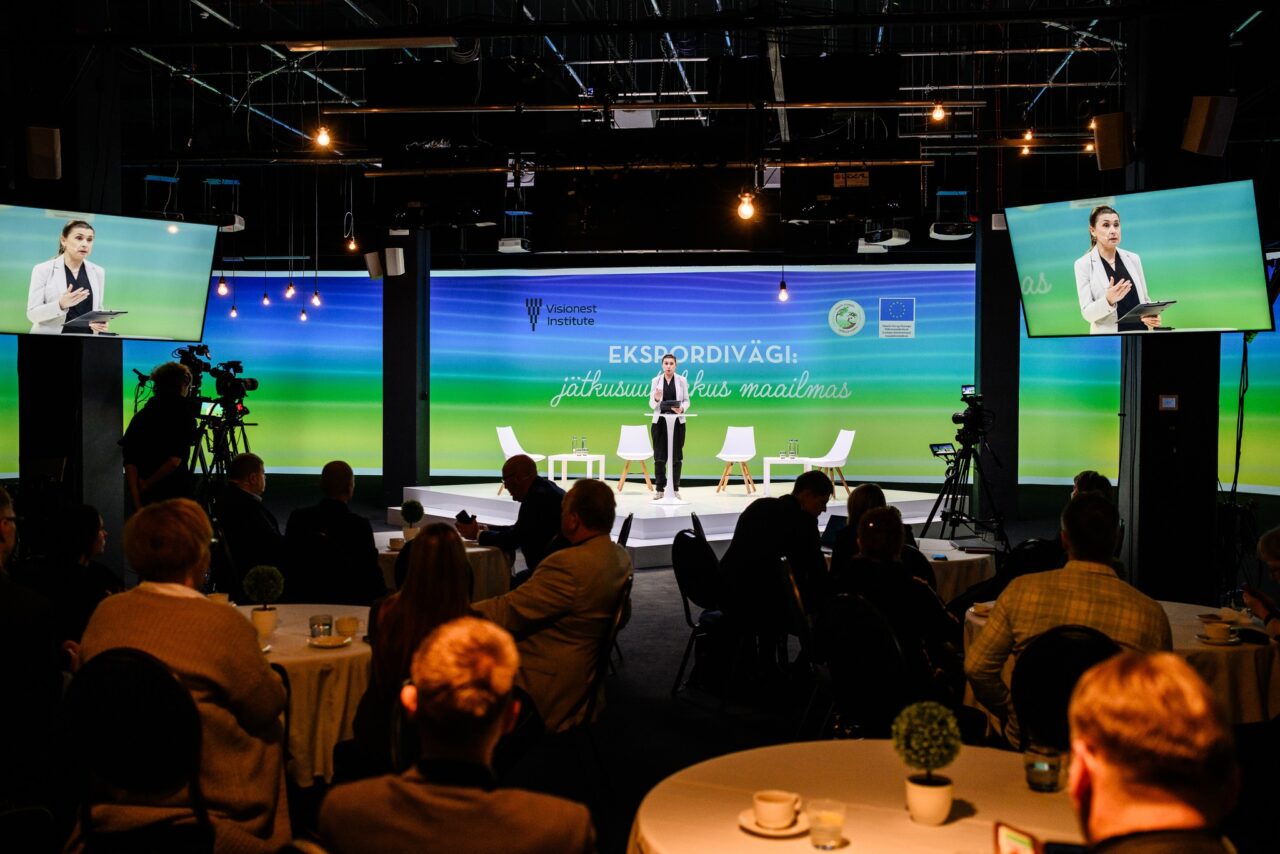Export Power programme improved the competitiveness of Estonian companies in the food sector
The Export Power project provided training and knowledge in the field of exports to Estonian food producers and processors. Its goal was to enhance their sales capabilities. Anu-Mall Naarits, CEO of the Visionest Institute (formerly the Marketing Institute), provides a compelling example of the project’s impact – 75% of participants plan to increase their export turnover by more than 50% in the coming years. Read more about the program from Anu-Mall’s perspective.
At the beginning, we spent a long time figuring out what to call the project. We knew that the aim was to increase and develop the export capacity of Estonian food producers and the agricultural sector. To train, mentor, guide. So we wanted the name to really convey that power. And so we have come full circle to the power and the strength that is generated in the very many small businesses for which training programmes are usually either not available or too expensive, time-consuming and also impractical, as is often complained about.
The background was also known to us – there is very little cooperation between Estonian companies, including in the export field, and they tend to kick the decks off each other. Of course, we have several very strong regional food production networks, for example in Saaremaa, Jõgeva County, Viljandi County and Võru County. But still, some entrepreneurs say that “too much steam goes into networking and we don’t get the result”.
It is extremely difficult to make a go of it in the export business when you are alone and relatively small. There is simply no strength – knowledge-skills, time, money, manpower… That’s why “Export Power” had a big challenge from the start, especially since we launched in the middle of the pandemic in 2021. Everything was virtual, which felt weird at first. How do you do hybrid conferences or online training sessions? But then again, it’s challenging times that make us smart. This whole programme has been a guessing game, but we are now richer with a good set of valuable solutions.
New Ways of Learning
So, how did “Export Power” change things for people’s mindsets? First, everyone realized they didn’t have to travel all the way to Tallinn for a whole day of training. That eats up too much time for small businesses like us. Instead, we could learn online for half a day. We could negotiate, analyze the market, talk to the trainers, apply what we learned to our own companies, and so on. Maybe you’d get so far with your export plan that you’d be like, “Wow, this is great, I can start implementing this right away!” Or maybe you’d realize, “Phew, thank goodness I played this out on paper first. My original plan wouldn’t have worked. I gotta be smarter about this, and now I know how.”
These are the kinds of things people told us after they went through our program on how to plan exports step-by-step. They also gained a lot of confidence. They realized, “We can do this! We’re good! We have fantastic products and really cool ideas. Sure, we need to develop more, but we’re already off to a great start.”
Study Tours: More Than Just Sightseeing
We worried a bit about what to do on the study tours to get everyone to come along. What would they learn? Would they find it valuable? Sure, foreign countries are exciting, but what about these tours in Estonia? Well, we learned a quick lesson: the study tours turned out to be some of the most valuable learning experiences, literally. People were able to focus entirely on learning, development, gathering knowledge, and networking for a few days.
Can you imagine how much you can learn by asking questions and sharing experiences? Things like “How do you do that?”, “What’s the story with this packaging?”, “Is this working out for you?”, “I’ve been following you for a while and I think your stuff is amazing. We should collaborate sometime!”
Collaboration is Key
We think we truly mastered using every minute on the study tours for learning and sharing experiences. People came and got what they needed in a very efficient way. They focused on self-development, analysis, finding solutions, observing categories in stores, and many other things that small food producers often don’t even realize are important. Throughout all of this, we built trust and even signed cooperation agreements. Thanks to these amazing study tours, we were also able to create a network of contacts that will last a long time beyond the project itself.
More Than Just Tours
On top of the training and study tours, we also had a ton of information days and podcasts. Many of the tips, like how to break into the Arab or Asian markets, are still super relevant for years to come. So, if you missed the “Export Power” train, there’s still time to learn and catch up!
We were thrilled to have almost 222 companies participate in the nearly three-year “Export Power” project. Almost all of them (with a few exceptions) worked incredibly hard to use the knowledge and skills they gained from the project to grow their exports. We explored roughly 30 different markets in total. Everyone in the program was looking for ways to find new export channels and become even more efficient.
There was a real sense of community and shared struggle. People realized they weren’t alone in facing these challenges. They could talk to each other, ask questions of the trainers, and see that solutions did exist. Nobody was just going through the program to check a box. They were there because they genuinely wanted to improve their businesses. I can’t wait to see our traditional summary report, which we’ll put together a year after the program ends. It will clearly show what the companies were able to achieve and how their efforts have impacted their export sales, sales performance, product value proposition, and production capacity. Of course, it is also important to grow in markets where we are already active. When the heel is between the door and the cherry, you have to keep looking for ways to grow and expand in that market, instead of being a tiny player in dozens of international markets.
The programme was extremely exciting and interesting for us too. “Export Force” gave the Visionest Institute the confidence that we could work with more and more food companies, for example in Ukraine, to help them find solutions to product development and logistics problems in the midst of war.
Many thanks to the participants and to the Ministry of Agriculture for initiating and organising this project! I wish everyone strength, growth, faith and excellent cooperation in conquering international markets!
Comments from the Program Participant:

Mai Tooming, Wiru Mill OÜ, Member of the Management Board, training participant
I think it is crucial that our sector is offered such training. I am also very satisfied with the facilitators. I was amazed at how we as participants were followed up so intensively and systematically.
If you are prepared to take part in a training course, you can make it a hundred times more useful for yourself if you create a window of time to concentrate on it properly. We all have many important things to deal with in parallel in our daily work, but you just have to make time for training. If you can do that, you will have already done the essential preparation for the process.
We have decided to start exporting, but we are not doing that yet. “The reason why we went to the ‘Export Force’ training is precisely because we want to start. Exporting needs preparation, and that is what we have been doing since the second half of last year. If you have export in mind, this training will teach you how to get into action. We went through all the topics related to exporting step by step.
In this kind of training you will learn a lot of new things and you will remember old knowledge that you might not have needed for a long time.
All the stages of the training were interesting and necessary. Among the study trips, I went on a trip to Finland and to the Riga fair, which were very important and interesting. Even when I read the programme, these trips seemed exciting. But what made them necessary was that it was not just a matter of demonstrating things that worked, but also of making contacts.
We have kept in touch with one of the lecturers, Roland Lock, from the Export Force, and we now have a long-standing collaboration outside the programme. Developing a foreign market is not something you just decide to go into, but you need to have all the preparation: how your products look, what you have to offer in the long term, etc…. We have worked with Roland on all these details.
